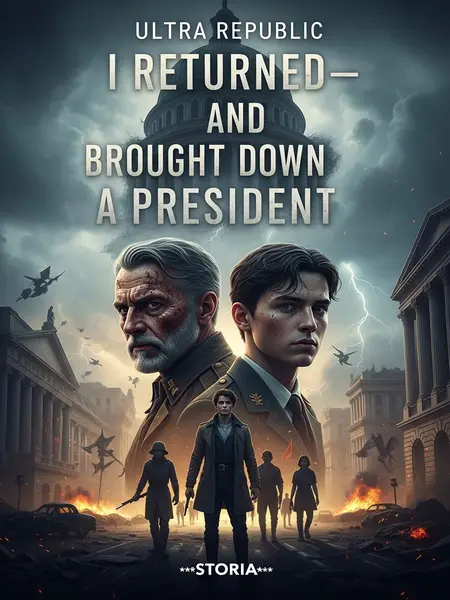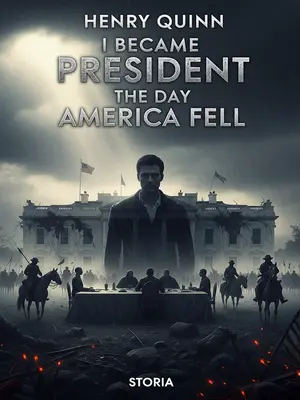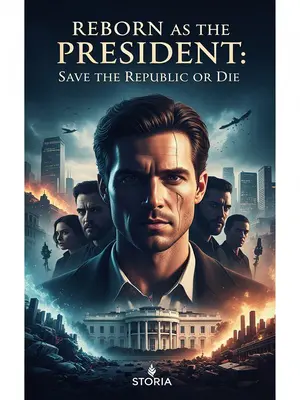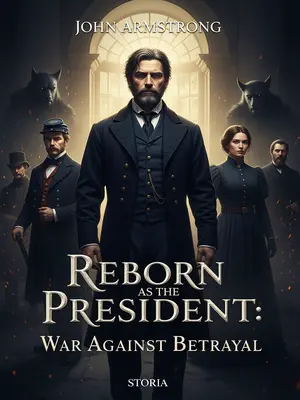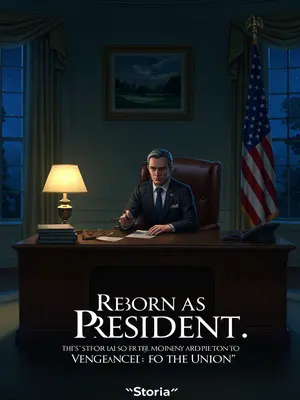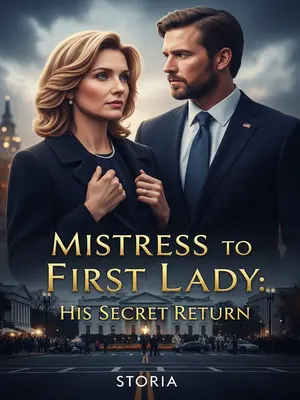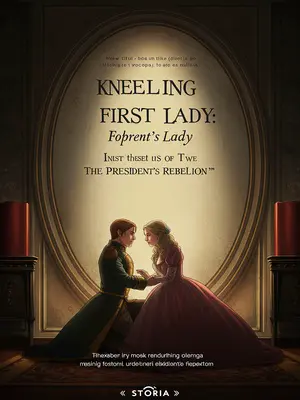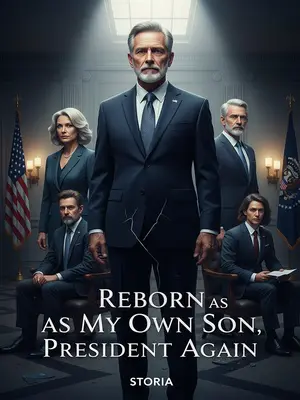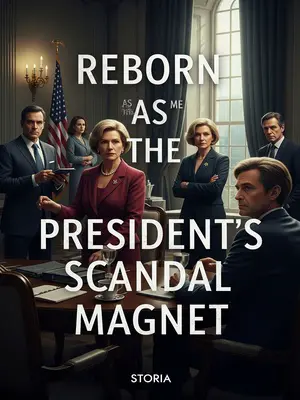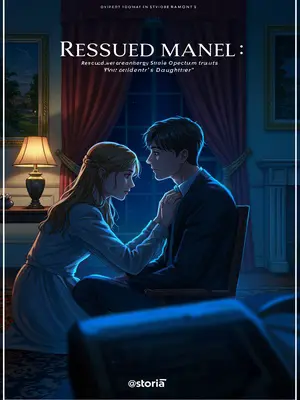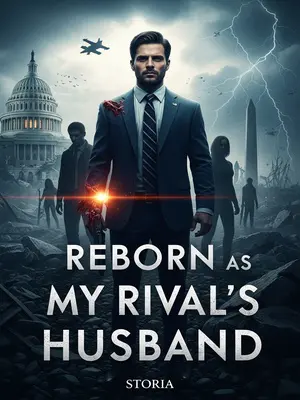Chapter 3: The Stranger’s Prescription for Revolution
All the officers followed their General’s gaze to the tent door. The silence was complete.
No one spoke. The only sound was the rain beginning to tap against the canvas, soft and insistent.
Footsteps sounded outside. Each step rang clear, steady as a drumbeat.
Boots on wet earth, steady and unhurried. The kind of walk that spoke of confidence—or recklessness.
Ben Hayes suddenly lowered his head, starting to look at the paper in his hand. He pretended to read, mind racing.
He pretended to read, but his mind was elsewhere, racing through memories and possibilities. Old hopes, old fears.
It was only a poem, a gift from the Chief long ago. He mouthed the words, remembering the day it was written.
The handwriting was unmistakable—firm, elegant, full of life. The words were simple, but they carried the weight of a thousand promises.
But the handwriting on the paper, that familiar script, was now magnified and blurred. He, who could focus for three days and nights to finish a battle report, now couldn’t take in the few lines before him.
His vision swam, the letters dancing on the page. He blinked, willing himself to focus, but the past kept intruding.
He couldn’t think of anything else. That letter was all that mattered.
The world had narrowed to this moment—this letter, this memory, this hope. The past and present blurred together.
The guard’s voice suddenly sounded: “General, the person is here.”
The tent flap rustled, the air charged with anticipation. Every man in the room straightened, hands drifting unconsciously toward their weapons.
Then he heard a young man’s voice, with a faint smile: “Ben Hayes of Maple Heights, I’m here to pay my respects.” The words were clear, confident, almost teasing.
The voice was calm, almost playful, with a confidence that belied his youth. The words hung in the air, daring anyone to challenge them.
With a crash, thunder struck. The tent shook, the sky split open.
The storm broke at last, lightning splitting the sky. The tent glowed for an instant, the world outside illuminated in stark relief.
Like a blessing from above, the lightning illuminated the visitor’s face. For a heartbeat, he looked almost ethereal.
The young man stepped forward, his features clear in the flash—sharp cheekbones, steady eyes, a smile that hinted at secrets. The room seemed to shrink around him.
At that instant, Ben Hayes suddenly froze. His heart hammered in his chest, the past and present colliding.
He stared, heart pounding, as if he’d seen a ghost. For a moment, the years melted away, and he was young again, standing in the shadow of giants.
In that brief moment, he saw a delicate young man with a face like marble, bright as a summer sunrise, calm as a winter moon, strolling in leisurely, looking at him with a faint smile. The resemblance was uncanny.
The young man’s presence filled the room—calm, unhurried, as if he belonged there. His eyes held a thousand stories, and his smile was both invitation and challenge.
Wearing a faded college scarf, dressed in simple work clothes, carrying himself with the quiet strength of someone who’d carried a whole country on his shoulders. He looked like a man who’d walked through storms and come out the other side.
The scarf was a splash of color against the gray, a reminder of better days. His boots were scuffed, his hands rough, but he moved with the quiet assurance of someone who’d seen the world and survived it.
For a moment, he seemed to see an old friend. The feeling was so strong it hurt.
Ben’s breath caught. The resemblance was uncanny—too much to be coincidence. He gripped the letter tighter, knuckles white.
Ben Hayes gripped the paper, asking, word by word: “This slip—whose writing is it?” His voice was raw, desperate for an answer.
Richard Whitmore, using the alias Grant Young, looked at the elderly Ben Hayes before him, his eyes flickering before he slowly lowered his gaze and bowed in salute. The gesture was deep, almost reverent.
The bow was deep, respectful, the kind reserved for mentors and legends. For a moment, the room felt like a church, every man holding his breath in silent awe.
He introduced himself as a student of the famous Dr. Samuel Blake. After studying by the Clear River, he followed Dr. Blake back to his ancestral home in Silver Hollow, traveled through Maple Heights and old towns, dreamed at Ridgefield, discovered a cure for heart disease, and came specifically to offer it to the General.
His words painted a picture of a restless soul—always searching, always learning. The mention of Ridgefield sent a ripple through the room, the name carrying more weight than most realized.
At the mention of Ridgefield, Ben Hayes’s eye twitched, his gaze suddenly sharp. Decades of battlefield experience gave him a presence—a single glance enough to instill fear.
The change was immediate—Ben’s posture straightened, his eyes narrowing as he studied the young man. The years of command returned in an instant.
He asked in a deep voice: “Who are you?” The words were heavy, almost a dare.
The question was a challenge, a demand for truth. The room tensed, waiting for the answer.
The youth was unfazed. His eyes were bright, and up close, his face was exceptionally pale, the pallor of someone just recovered from a serious illness, almost without any color. He didn’t flinch.
He met Ben’s gaze without flinching, the hint of a smile playing at the corners of his mouth. The room seemed to grow colder, the air charged with anticipation.
He began to speak. The room hung on every word.
His voice was steady, each word deliberate. He spoke not just to Ben, but to every man in the room, his confidence infectious.
He spoke of his travels, of the people of Pine Ridge and Oak Valley, of the night rain in Capital City, the thunder in Grand Junction, the Blue River in Dayton, the customs of the thirteen states, the newly joined officers, and the state of the nation. He listed names, places, stories—painting a tapestry of the Republic in crisis.
He wore simple clothes and work boots, unhurried, as if reuniting with an old friend. Finally, he said, I am here to offer medicine to the General.
He spoke the last words softly, almost as if sharing a secret. The room stilled, every eye fixed on him.
The officers in the tent frowned again at his words. The skepticism was thick.
Skepticism flickered in their eyes. They’d seen too many smooth talkers, too many false prophets. The silence was thick, expectant.
A brash young doctor seeking fame, claiming to admire Chief Whitmore, so his handwriting resembled his—who would believe that? He had visited all the key places in the Republic, was clearly from Silver Hollow, yet had a Capital City accent—obviously suspicious. The officers exchanged glances, suspicion growing.
Whispers darted through the tent like nervous birds. The contradictions in his story were too neat, too convenient. The officers exchanged wary glances, their hands drifting closer to their weapons.
Besides, the nation was now split in three; who didn’t know the Republic was weak, and the United States was at its zenith? Why would he come to join the Republic? The logic just didn’t hold.
The question was unspoken but clear in every face. No one defected to a losing side unless they had something to gain—or something to hide.
Moreover, everyone knew General Ben Hayes’s situation was dire and awkward. It was an open secret.
His reputation was in tatters, his allies few. To throw in with him now was to bet on a losing horse, and everyone knew it.
After his staunch supporter Charles Dean died, Paul Rivers’s faction rose to power under the banner of peace and unity, and calls for stability were constant. The old alliances were gone.
The political winds had shifted, and those who once cheered for war now whispered for peace. Rivers’s men talked of unity, but their eyes were always on the next opportunity.
The General was originally a turncoat, long absent and not skilled in politics, and was at odds with the Southern, Western, and Eastern factions. He was a man without a country, even in his own land.
He was an outsider in his own camp, never quite trusted, never quite forgiven. The factions circled like vultures, waiting for him to falter.
Seven years ago, at the Battle of Pine Ridge, Harold Jenkins’s failure to arrive on time led to a crushing defeat, with heavy casualties and the loss of half of the Republic’s foundation, shattering the General’s years of accumulated reputation. The pain was still fresh.
The scars of that defeat ran deep. Men still whispered about it in the dark, blaming Jenkins, blaming fate, blaming Hayes. The Republic had never really recovered.
After several more defeats, Justin Arnold and Leo Shaw defected to the United States, and the General’s trusted followers grew fewer. The betrayals piled up.
Each betrayal was a knife in the back, the list of loyal men shrinking with every passing month. Trust was in short supply.
Now, the cabinet’s impeachments were unending, slanders of greed for merit constant. Every day brought a new accusation.
Every day brought new accusations, new rumors. Hayes’s name was dragged through the mud, his every move questioned.
Worse, the crooked advisor Howard Crane hated the General, forcing him to take refuge in Red Creek. It was said even Chief Whitmore’s son joined in the petition to dismiss the General—there was no safety left.
The irony was bitter. The very people he’d fought to protect now turned against him, their trust eroded by Crane’s poison.
Coming to rely on the General now? The General himself was like a clay idol in a flood—looked strong, but bound to crumble. Wasn’t this just asking for trouble?
The officers exchanged glances, the skepticism in their eyes hardening. No one wanted to be the last fool left standing when the music stopped.
Most likely a spy. The suspicion was nearly a certainty.
The word hung unspoken, but everyone felt it. Trust was a luxury they couldn’t afford.
Matthew Irons lost patience: “With war at hand, why waste words with a charlatan doctor—” He was ready to end this.
His voice was sharp, his hand twitching toward his belt. The room tensed, the air thick with suspicion.
But Ben Hayes raised his hand to signal silence. The gesture was enough to quiet the room.
Ridgefield—
The name echoed in Ben’s mind, stirring memories he’d tried to bury. The place meant something—something important.
It had been nearly thirty years since the Chief’s death. How many still remembered he was buried at Ridgefield? Ben did, every day.
The years had dulled the pain, but the memory remained sharp. Ridgefield was more than a grave—it was a promise, unfulfilled.
As the young doctor spoke, he walked to stand before Ben Hayes, so close that his confidant Paul Rivers instinctively stepped forward, hand on his holster. The tension spiked.
The tension in the room spiked. Rivers’s hand hovered near his weapon, eyes never leaving the young man.
At this moment, Paul Rivers realized the General’s eyes, bloodshot, now shone with light; in his exhaustion was a kind of breathless hope. It was a shock.
For the first time in years, Paul saw something new—a spark of life, a glimmer of the old fire. He stepped back, uncertain.
—He had listened to the youth’s words. The meaning sank in.
The realization hit him hard. Ben Hayes, the man who trusted no one, was listening—really listening.
“I am here to offer medicine to the General. This medicine has been prepared for three years, and today it is ready. It will surely cure the General’s heart disease.” The words were bold, almost reckless.
The words were bold, almost reckless. The promise was impossible, but the conviction in the youth’s voice made it hard to dismiss.
The General’s heart disease? The thought echoed around the room.
A hush fell. Everyone knew about the General’s health, though no one dared mention it out loud. The idea of a cure was both hope and insult.
Ben Hayes felt bitterness at these words. He was past his prime, his hair white, alone for over thirty years, having exhausted his strength, failed the Chief’s trust, and earned only heaven’s wrath and man’s anger. Now, with the government in chaos, he was powerless to turn the tide. This illness—terminal, incurable! The words stung.
He clenched his jaw, the weight of years pressing down. The promise of healing felt like a cruel joke, yet something inside him stirred.
The youth produced a roll of silk. The gesture was almost theatrical.
The gesture was theatrical, but the room was too tense for anyone to laugh. All eyes followed the silk as it unfurled.
Another clap of thunder outside the tent, the youth slowly unrolled the map, raising his hand as if to wave a fan, then lowered it. The drama was lost on no one.
Lightning flashed, illuminating the map in stark relief. The young man’s hand hovered over the paper, steady as a surgeon’s.
He said: “This is the Republic map, to assist the General’s great undertaking.” His voice rang out, clear and confident.
His words rang out, clear and confident. The officers leaned in, curiosity overcoming suspicion.
The map, close at hand, was clear—not just the counties of Maple Heights, but a map of all thirteen states of the land! The detail was astonishing.
The detail was stunning—rivers, roads, every town marked with care. It was the kind of map only a true believer would bother to make.
...It was a grand plan for the Republic! The scale was breathtaking.
The implications were staggering. The map wasn’t just a tool—it was a vision, a promise of what could be.
Back when the late President entered the Republic, the assistant official Samuel Brooks presented the map of the Western States, helping the late President win twelve counties and establish the Republic’s foundation. The story was legend.
The officers remembered the story well—how Brooks’s map had turned the tide, how a single act of faith had changed the course of history. The parallel was impossible to ignore.
Now this man, offering a map of the thirteen states—did he mean to help the General conquer the nation for the Republic? The thought was wild.
The question was absurd, yet the possibility lingered. Was history repeating itself, or just mocking them?
Absurd. But the idea was hard to shake.
The word echoed in the silence, but no one dared say it out loud.
Now, of the thirteen states, nine belonged to the United States, three to the Confederation, and the Republic had only Capital City. The odds were hopeless.
The odds were hopeless, the task impossible. Yet the map remained, a silent challenge.
He was not Chief Whitmore, with one state’s strength to resist the United States. The weight of history pressed down.
Ben’s hands shook as he traced the borders. The past was a weight he could barely carry, and the future looked even heavier.
Not far away, the deputy general Justin Arnold pressed the map in his chest pocket and couldn’t help but retort: “Isn’t it just a map? The General has plenty—this too you bring as a treasure...?” The doubt was plain.
Justin’s voice was mocking, but there was an edge of fear beneath the bravado. The map was more than paper—it was a dare.
Paul Rivers coldly rebuked the deputy: “Enough.” The command was sharp.
His voice was sharp, the command clear. The room fell silent, the tension thickening.
Ben Hayes looked at the old capital of the Republic, the Chief’s words echoing in his mind. He wondered if he’d ever live up to them.
He closed his eyes, letting the memories wash over him. The Chief’s voice was as clear as if he stood beside him, urging him on.
Exactly as the youth said: “The traitors cannot coexist, real power cannot settle for a corner! The General’s strategy is not in Red Creek, nor in Maple Heights, but should be here. Is that right?” The words rang true.
The words struck home. Ben had thought the same, once. He’d just forgotten how to believe.
Ben Hayes had once thought so, but later dared not think it again. The memory was bittersweet.
He’d buried his dreams with the Chief, convinced the world had no more use for men like him. The hope had died, or so he thought.
The youth’s pale face showed a strange smile, and he coughed softly. The fragility of it was jarring.
The sound was fragile, a reminder that even prophets were mortal. Yet the smile lingered, defiant.
Everyone was watching him. He was clearly delicate and frail, but at this moment, he had an aura that ordinary people did not possess. The certainty in his eyes was blinding.
The officers felt it—the certainty, the conviction. It was contagious, and for a moment, they let themselves believe.
That thing was certainty. The kind that could move mountains.
